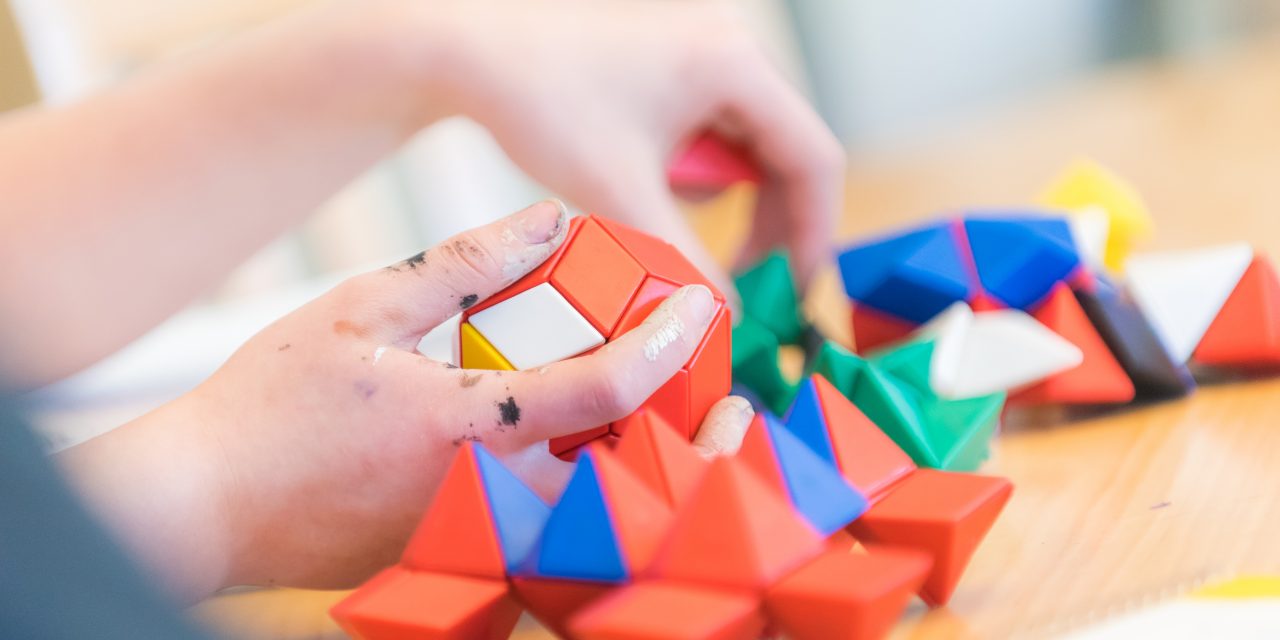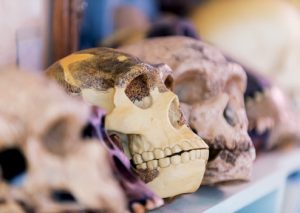
Since 1977, the Saturday Course Has Thrilled Children Every Week

Twelve fourth graders crowd around a skeleton splayed out on a lab table, feeling their own collarbones as their teacher guides them through their upper skeletal system. It is a Saturday morning in the Pritzker Science Center and this is “Blood and Guts,” one of many fascinating hands-on classes offered at the Saturday Course. In Ware Hall, another class of fourth graders are so engrossed watching their “Trial Court” teacher discover “evidence” on a fellow student that they stretch their bodies over their desks for a better view. This all happens within the first hour of the first day; students are fully on board and energy is the vibe. “Now the magic is happening,” says Kristan Burke, director of the Saturday Course, who has already had a busy start to the morning, welcoming 277 new students to the program.
The Saturday Course began in 1977; it was the brainchild of then-Lower School Principal Elizabeth “Betty” Greenleaf Buck, who found inspiration at an education conference in England. The idea: use the physical and academic resources of Milton Academy to benefit students from surrounding communities. Today, 1,000 students, representing 100 public schools in the greater Boston area, participate in five sessions during the school year. They are selected by their own teachers and administrators who know which students would excel and enjoy an advanced educational environment. Students start in fourth grade and two of the sessions are devoted just to them. They can continue to participate in the program until eighth grade. The format has largely remained unchanged: two courses with a snack break in between on five or six consecutive Saturdays per session. Students rate their top choices for classes on the registration form and find out their placement that first morning.
“For 40 years, the recipe has worked really well,” says Kristan, who started with the program as a teacher in 1994. “Parents really need programs for their children who are academically motivated to experience instruction that they’re not getting in their schools. This program provides that spark of interest for students seeking more.”

Gary Shrager makes them laugh (Kristan Burke in background) at the 40th anniversary celebration of the Saturday Course. Photo by Greg Katsoulis
The core recipe may remain unchanged, but other changes have occurred over the years.
“It’s certainly larger, as far as the number of students, but larger can be better because you’re serving more students,” says Gary Shrager, Lower School dean, who spent 32 years with the program and until this year co-directed with Kristan. “But as we grow, we need to make sure we are still doing a great job, so we never change certain things. We still have small classes. We still have dedicated and creative teachers. We just went out and found more of them!”
The teachers, who return year after year to spend their Saturday mornings with the students, are critical to the program’s success. Many are public school teachers who enjoy teaching outside of curriculum requirements. A few are current and former Milton Academy teachers and a few are public school principals who enjoy being back in the classroom. One is a working actor, one is an archaeologist, and one is a docent at the Museum of Fine Arts. This varied group of educators meet early for a lively breakfast in Greenleaf Hall before students arrive. Dedicated former students, now in high school and college, return to help out as interns.
“The core of the Saturday Course is the great relationships that form in the classes. This happens because we have great, fun kids who all want to be here. They like doing extra academic work with teachers who love this kind of stuff,” says Gary. “As a teacher, you’re not pulling teeth or saying ‘please pay attention.’ There’s none of that. You just put the stuff out there and they gobble it up. Within minutes of the first class, they’re starting to work. I learned quickly that if I want the students to meet each other, I have to figure out how to do that in different ways because they just want to start doing stuff. They’re really hungry for it.”
Another unchanged aspect of the program is no grades. There is no structured assessment of students. Instead, students do the assessing and fill out evaluations for each class. Gary says, “We read every single one of these and learn from them. We look for trends and make changes based on them.”
In the fall, the Saturday Course celebrated its 40th anniversary in Straus Library with current and former teachers and administrators gathering to reminisce and celebrate the success of a program of unusual longevity. “When I started, there used to be programs for what they then called ‘gifted and talented’ students in all sorts of schools,” says Gary. “For a variety of reasons, almost all of them are gone, mostly because of money.”
 Both Kristan and Gary say the support of Milton Academy has been crucial to the success of the program. Use of the School’s facilities allows the Saturday Course to keep tuition low and ensures that any recommended child can attend, regardless of family resources.
Both Kristan and Gary say the support of Milton Academy has been crucial to the success of the program. Use of the School’s facilities allows the Saturday Course to keep tuition low and ensures that any recommended child can attend, regardless of family resources.
This year, the Saturday Course branched out beyond greater Boston to India. Lower School Principal Racheal Adriko introduced Kristan to a former student from her old school in Cambridge, Massachusetts. Lakshya Kaura, a young science teacher now living in Ballabgarh, Haryana, India, was working on a science education book to bring a science curriculum into underserved schools in his area. The Saturday Course decided to partner with him to bring his book, The Learning of Science Begins with Why?, to life. Kristan traveled to India in August to visit some of the schools. Lakshya’s book includes science experiments that “work well because of their accessibility and inclusion of inexpensive, everyday objects.” The plan is for Saturday Course students to experiment, analyze and share the results with their peers from Ballabgarh, India.
This partnership shows how a program that sticks to its roots can also adapt, explore and change.
“I definitely think there were ‘good old days’ of the Saturday Course, but I’m happy about our growth because we reach more students that need this kind of programming,” says Kristan. “As the world has changed in 40 years, so has children’s awareness of the world around them, and so has their capacity to take in more than maybe we all did growing up. So that is a challenge and we try to adapt. We’ve also embraced technology more and our course offerings reflect that. I see a great future ahead, because this kind of programming will always be vital to kids.”
By Liz Matson




